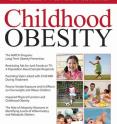CDC study looks at link between age at first solid foods and later child obesity
Does the timing of introducing solid foods to the infant diet affect a child's risk of being obese by 6 years of age? A new study from the Centers for Disease Control and Prevention (CDC) analyzed data on infant feeding practices, with a 6-year follow-up to determine obesity, and also explored the potential impact of breast versus formula feeding. The results are reported in Childhood Obesity, a peer-reviewed journal from Mary Ann Liebert, Inc., publishers. The article is available free on the Childhood Obesity website until June 11, 2016. In the article, "Age at Introduction to Solid Foods and Child Obesity at 6 Years," Chloe Barrera, MPH, Cria Perrine, PhD, Ruowei Li, MD, PhD, and Kelley Scanlon, PhD, RD, compared the chances of child obesity at 6 years of age depending on whether infants first began eating solid foods earlier than 4 months, between 4-6 months, or at or later than 6 months of age. More than 1 in 10 of the 6-year-olds included in the study were obese, but the time of introduction of solids had no effect.
"Given the conflicting findings from previous research about whether the early introduction of solid foods increased the chances of a child becoming obese, this important large-sample long-term study from the CDC raises this key question anew," says Childhood Obesity Editor-in-Chief Tom Baranowski, PhD, Baylor College of Medicine, Houston, TX. "Future research will need to assess adiposity at multiple points before 6 years and possible metabolic influences that could result from early introduction of solids on later child obesity."
Source: Mary Ann Liebert, Inc./Genetic Engineering News
Articles on the same topic
- UK study shows new potential marker for obesityWed, 11 May 2016, 19:37:20 UTC
Other sources
- New potential marker for obesity foundfrom Science DailyWed, 11 May 2016, 19:30:53 UTC
- Autism Risk Linked to High Folate Levels in Pregnancyfrom Live ScienceWed, 11 May 2016, 16:00:51 UTC
- Obesity may not take years off your life: Studyfrom UPITue, 10 May 2016, 19:31:16 UTC
- Child's obesity tied to mother's pregnancy weight, study saysfrom UPITue, 10 May 2016, 2:00:57 UTC
